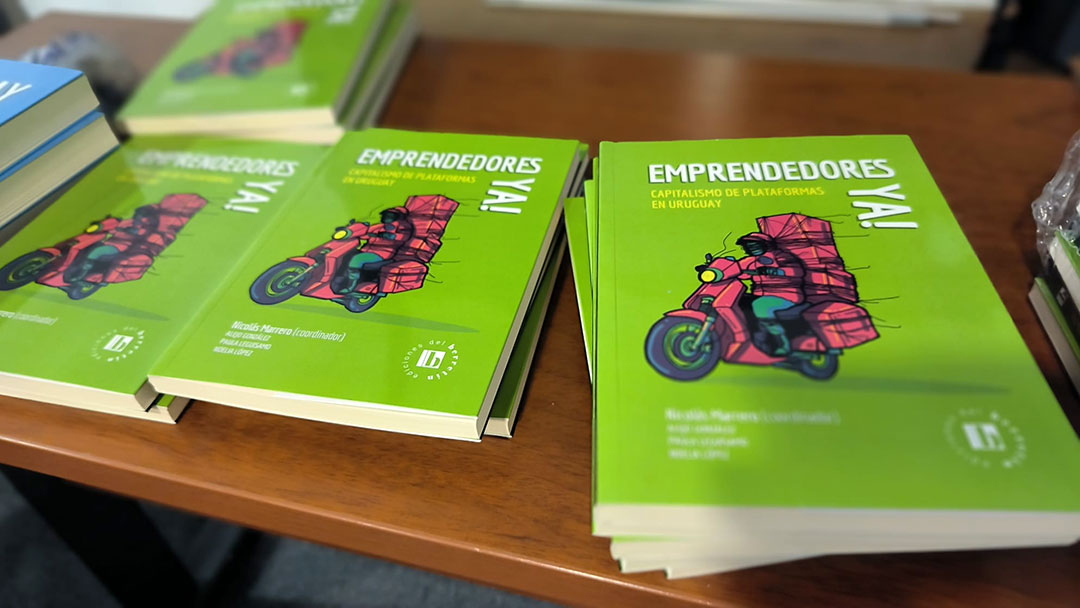This past Thursday, May 9, the book “Emprendedores YA! Capitalismo de plataformas en Uruguay” (“Instant Entrepreneurs! Platform Capitalism in Uruguay”) was launched at the School of Social Sciences of Uruguay’s University of the Republic, in Montevideo. One of the speakers at the event was Ricardo Antunes, a Brazilian sociologist and good friend of Rel UITA (IUF Latin America) who penned the book’s prologue and considers the study a valuable contribution to the analysis of the uberization of work.
Amalia Antúnez
15 | 5 | 2024

Ricardo Antunes | Photo: Amalia Antúnez
The publication was coordinated by sociologist Nicolás Marrero and it includes contributions by fellow sociologist Alejo Gónzalez Orge, social work expert Noelia López, and development expert Paula Leguisamo.
Platform capitalism is a relatively new phenomenon arising from successive crises that led to an increase in the structural mass of unemployed workers, a surplus workforce that is desperate and willing to accept anything, Antunes noted.
“An aggressive neoliberal ethos driven by the financial system, which is the most destructive form of capital, combined with high unemployment, constant productive restructuring, and the rise of technology were the basis for the emergence of digital platform companies”, the sociologist observed.
This kind of work is spreading more and more across the world and generating a complete deregulation of labor relations.
The men and women who provide services for digital companies are portrayed not as employees but as “independent contractors”.
“While entrepreneurism defines the bourgeois class, calling a mass of unemployed workers who lack basic rights entrepreneurs is, at the very least, criminal”.
Such discourse is, no doubt, part of “the (not so) discreet charm of the bourgeoisie, but that does not make it less of a fallacy”, Antunes said
According to Antunes, this type of work has a greater impact on societies in the global South, because these are regions where slavery was experienced and where even to this day there are labor conditions that are very similar to slavery.
“In Brazil, every day workers are rescued from near-slavery conditions. Outsourcing and flexibilization are euphemisms to avoid saying that labor conditions are being made increasingly precarious. This whole scenario provides fertile soil for digital platforms”.
An additional serious consequence of this type of work is its extremely high accident rate.
“Workers do whatever it takes to deliver their orders, so that they can have an income that will allow them to cover the costs of their equipment (vehicle, cell phone, etc.) and make a living and provide for their family”, the sociologist explained, reporting that each day more than one delivery worker dies in São Paulo.
Platform capitalism fosters nineteenth-century working conditions and poses a huge challenge to class-based labor organizations, because it is not easy to organize workers who see themselves as their “own bosses”.
Which is why this publication is so important. It is the product of a research study conducted jointly by academics and trade unions, and it arises from a concern over this kind of labor relations within a labor movement that sees it as the epitome of exploitation of human beings by human beings.
The authors also address issues such as the regulation of labor relations in digital platform companies and expose the legal vacuum that exists in that sense.
“All of these companies go into different countries violating existing labor rights, and undermining or evading labor legislation. States only come in after to regulate what are already faits accomplis”, Nicolás Marrero said.
They legislate under the premise that this reality already exists and that all that is left to do is to create an intermediate statute where platform workers are neither independent nor dependent, thus remaining in a legal limbo.
“In Uruguay over the next few weeks the Labor Legislation Committee will discuss two bills that seek to regulate work in these platforms”.
According to Marrero, one of these bills consolidates the idea of the false independent worker, but it is touted as progressive because it gives certain rights to workers who have no rights at all. “This is very dangerous because it reflects tendencies that are occurring in the world of work in general”.
Something similar is happening in Brazil, where president Luiz Inácio Lula da Silva presented a bill that Antunes describes as a true abomination. “It could be called the Uber Bill”.
Argentina is also seeing the same phenomenon. Right now, the Senate is considering the so-called Bases Law, which promotes extreme labor casualization, extending platform work conditions to the working class as a whole.
“We are witnessing a brutal dehumanization of work”, Antunes concluded.

Photo: Amalia Antúnez
